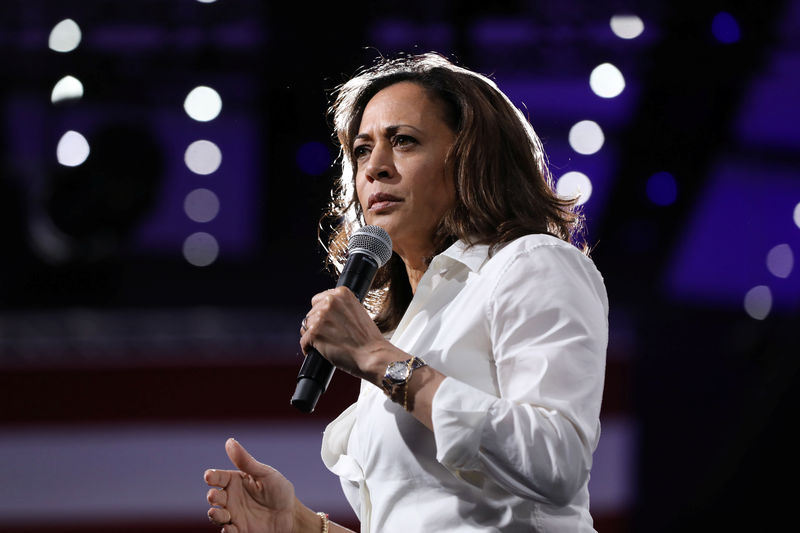By Sharon Bernstein
SACRAMENTO, Calif. (Reuters) - If elected president, Kamala Harris would restrict the legal use of deadly force by police, end the incarceration of juveniles in adult prisons and legalize marijuana at the federal level, the Democratic U.S. senator said in a plan set for release on Monday.
Her proposals are part of a criminal justice platform that Harris says must hold wrongdoers accountable without veering toward what she calls an unjust system of mass incarceration and arrest that has harmed communities of color and the poor.
“Americans deserve a criminal justice system that focuses on fairness, rehabilitation, and accountability to build trust and safe communities,” Harris said in a statement. “As president I’ll fix this broken system to make it fairer and more accountable for communities across the country.”
Harris is one of 20 Democrats seeking her party's nomination to take on Republican President Donald Trump in the November 2020 election. In an ABC News/Washington Post Poll released on Sunday, Harris had the support of 7% of Democrats and Democratic-leaning independents, behind former Vice President Joe Biden at 27%, Senator Bernie Sanders with 19% and Senator Elizabeth Warren at 17%.
A former prosecutor and California attorney general, Harris has struggled to balance her work history with concerns from many progressives and African-Americans that she supported a criminal justice system stacked against minorities.
Harris is black and grew up steeped in civil rights activism in California. But she so far has not won support from large percentages of black voters, many of whom have said in polls they are supporting Biden, who was No. 2 to Barack Obama, the first black U.S. president.
In her criminal justice plan, Harris pledges to end the use of private prisons and study the best ways to confine and rehabilitate violent offenders.
In a proposal aimed at easing national concern over police shootings of unarmed black men, Harris said she would push to restrict the use of deadly force by officers.
Current policies generally allows officers to shoot subjects when "reasonable," but Harris' proposal would restrict the use of deadly force to only when "necessary," a higher legal standard and more difficult to support in court.
Harris' plan also includes several reforms to the juvenile justice system. In addition to ending the practice of incarcerating some youths in adult prisons, she would allow juveniles sentenced to more than 20 years to petition for reduced sentences after 10 years and encourage states to replace much juvenile incarceration with community-based programs that allow offenders to repair the harm they have done.
Her plan to legalize marijuana at the federal level is also aimed at reducing levels of incarceration for nonviolent drug offenses, charges that disproportionately affect minorities.

Harris was scheduled to discuss her criminal justice plan on the MSNBC program "Morning Joe" on Monday.